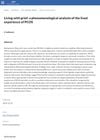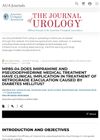 June 2021 in “Health and Society”
June 2021 in “Health and Society” Healthy lifestyle changes, especially weight loss, can improve symptoms and overall health in people with Polycystic Ovary Syndrome, especially if they are overweight or obese.
[object Object]  December 2020 in “Current Sexual Health Reports”
December 2020 in “Current Sexual Health Reports” Finasteride can have lasting negative effects on brain function and behavior by disrupting neurosteroid production.
 December 2016 in “The European health psychologist”
December 2016 in “The European health psychologist” Women with PCOS need more support to cope with isolation, helplessness, and grief, and to build resilience.
January 2015 in “Chinese Journal of New Clinical Medicine” Metformin combined with dyne-35 increases ovulation and pregnancy rates in PCOS patients.
951 citations,
December 2013 in “Clinical epidemiology” PCOS is a common hormonal disorder in women that can be managed with lifestyle changes and various medications.
26 citations,
July 2021 in “International journal of adolescent medicine and health” New treatments for PCOS are improving fertility and managing symptoms better.
 20 citations,
April 2012 in “Fertility and Sterility”
20 citations,
April 2012 in “Fertility and Sterility” Finasteride causes lasting fertility decrease in rats.
 3 citations,
April 2019 in “Journal of psychosexual health”
3 citations,
April 2019 in “Journal of psychosexual health” Women with PCOS often have sexual problems, and treating these issues early can improve satisfaction and reduce healthcare costs.
 2 citations,
January 2015 in “Springer eBooks”
2 citations,
January 2015 in “Springer eBooks” Environmental factors and exposure to toxins may contribute to male infertility by affecting sperm and hormone function.
 1 citations,
January 2022 in “Health”
1 citations,
January 2022 in “Health” COVID-19 has widely affected health, various industries, and the economy, but also led to more remote work and less pollution.
 June 2024 in “IntechOpen eBooks”
June 2024 in “IntechOpen eBooks” Myo-inositol-based treatments greatly improve pregnancy chances for women with PCOS.
 June 2023 in “Journal of Ayurvedic and herbal medicine”
June 2023 in “Journal of Ayurvedic and herbal medicine” Pumpkin seeds may improve health due to their rich nutrients and potential to treat various conditions.
 August 2019 in “Journal of archaeological science: Reports/Journal of archaeological science: reports”
August 2019 in “Journal of archaeological science: Reports/Journal of archaeological science: reports” Ancient hair can preserve hormones, revealing health and fertility insights.
 April 2018 in “The Journal of Urology”
April 2018 in “The Journal of Urology” Imipramine and pseudoephedrine treatment can effectively restore normal ejaculation in patients with diabetes, increasing their chances for pregnancy.
April 2023 in “Andrologia” American men are older, more obese, and have longer infertility than Canadian men.
 21 citations,
January 2003 in “Seminars in reproductive medicine”
21 citations,
January 2003 in “Seminars in reproductive medicine” The document concludes that various drugs can manage symptoms and metabolic issues in women with PCOS.
 15 citations,
January 2015 in “Clinical and Experimental Reproductive Medicine”
15 citations,
January 2015 in “Clinical and Experimental Reproductive Medicine” Taiwanese women with PCOS experience different symptoms based on age, with younger women facing more hormone imbalances and older women dealing with more metabolic issues.
 4 citations,
August 2021 in “Clinical and Experimental Reproductive Medicine”
4 citations,
August 2021 in “Clinical and Experimental Reproductive Medicine” The 2018 guideline for PCOS suggests new diagnostic criteria and treatments, but recognizes the need for more research.
3 citations,
January 1993 in “Toxicological Sciences” 2-Ethylhexanoic acid harms fertility and delays development in rats.
 March 2023 in “Seminars in reproductive medicine”
March 2023 in “Seminars in reproductive medicine” PCOS often leads to sleep problems, especially obstructive sleep apnea, affecting overall health.
January 2003 in “Seminars in Reproductive Medicine” PCOS understanding and treatment are advancing, requiring continuous updates for better patient management.
 121 citations,
April 2008 in “European Journal of Obstetrics & Gynecology and Reproductive Biology”
121 citations,
April 2008 in “European Journal of Obstetrics & Gynecology and Reproductive Biology” Many women in southern China have polycystic ovary syndrome, with some symptoms differing from Western women.
[object Object]  August 2024 in “The Journal of Urology”
August 2024 in “The Journal of Urology” The 2024 guideline updates recommendations for genetic testing, imaging, and sperm retrieval in male infertility.

Acne in PCOS can be managed with specific treatment strategies.
 May 2023 in “International Journal of Home Science”
May 2023 in “International Journal of Home Science” PCOS is linked to metabolic issues and infertility, needing more research.
 January 2008 in “The European Journal of Contraception & Reproductive Health Care”
January 2008 in “The European Journal of Contraception & Reproductive Health Care” Non-daily contraceptives cause fewer side effects and are more satisfying to women, and certain oral contraceptives can treat acne and seborrhoea, with a combination of chlormadinone acetate and ethinyl estradiol being highly effective and safe.
 17 citations,
April 2010 in “Archives of Gynecology and Obstetrics”
17 citations,
April 2010 in “Archives of Gynecology and Obstetrics” Obese women had more testosterone and less acne, but similar hair growth compared to non-obese women.
 6 citations,
April 2018 in “Obstetrics, gynaecology and reproductive medicine”
6 citations,
April 2018 in “Obstetrics, gynaecology and reproductive medicine” Most women with hirsutism have it because of PCOS, and they need long-term treatment including medication and hair removal to improve their condition.
 1 citations,
January 2023 in “Metabolites”
1 citations,
January 2023 in “Metabolites” Changes in gut bacteria can contribute to the development of Polycystic Ovary Syndrome (PCOS), affecting metabolism, immunity, and causing inflammation. Treatments may involve adjusting these factors.
 December 2024 in “International Journal of Advanced Research”
December 2024 in “International Journal of Advanced Research” Metformin and vitamin D3 help manage insulin resistance and hormonal imbalances in obese PCOS patients.























